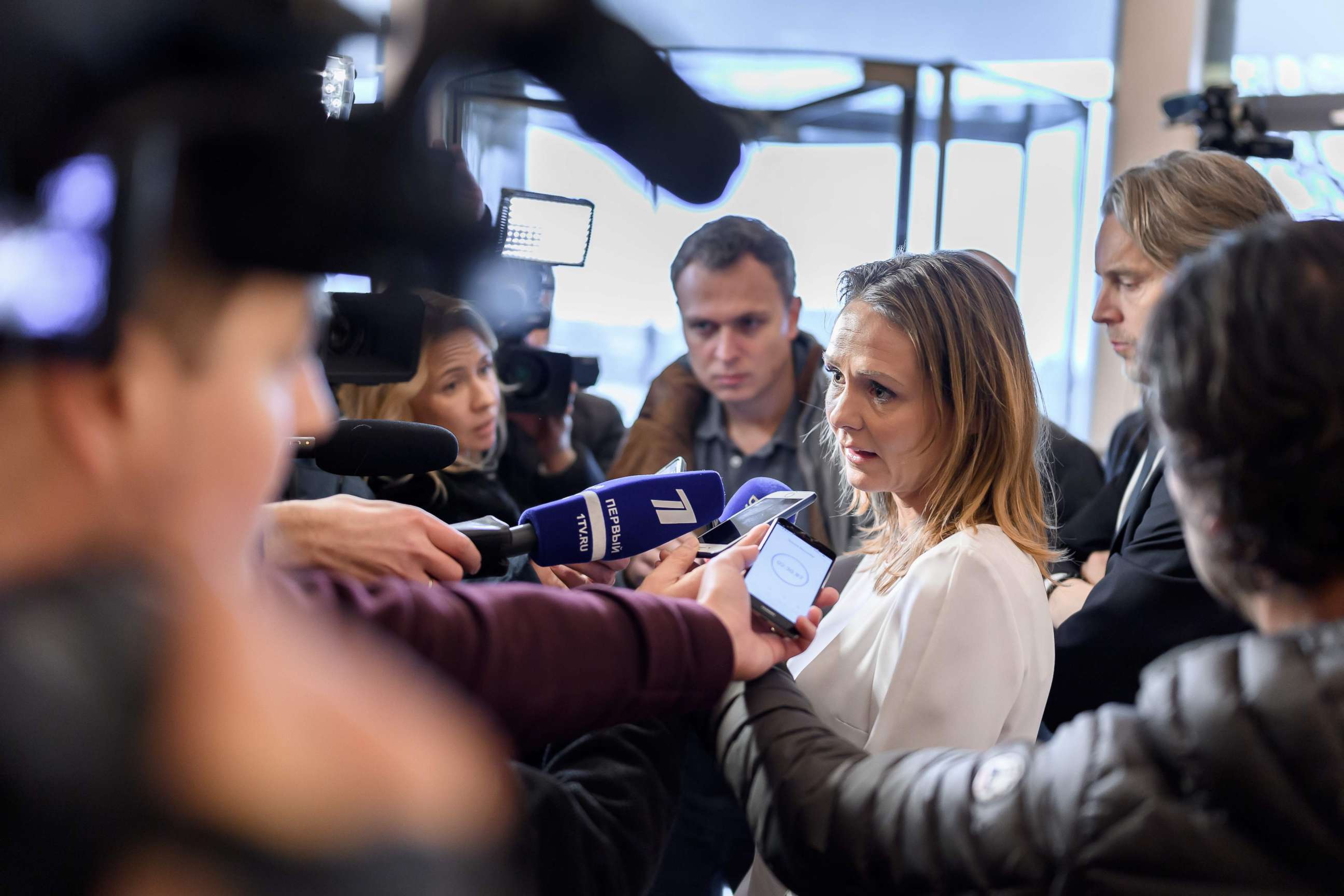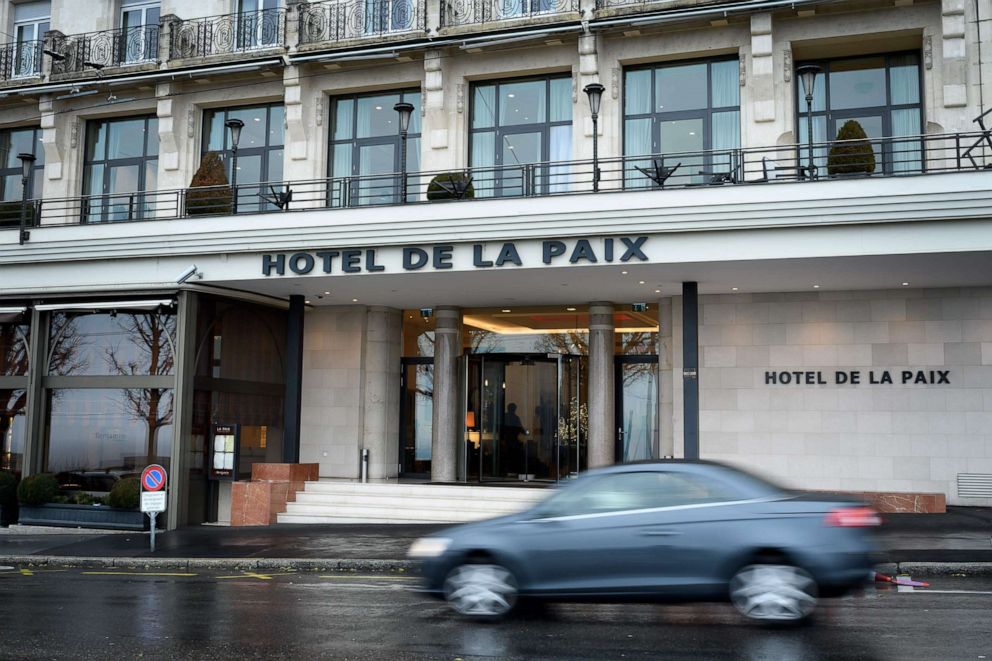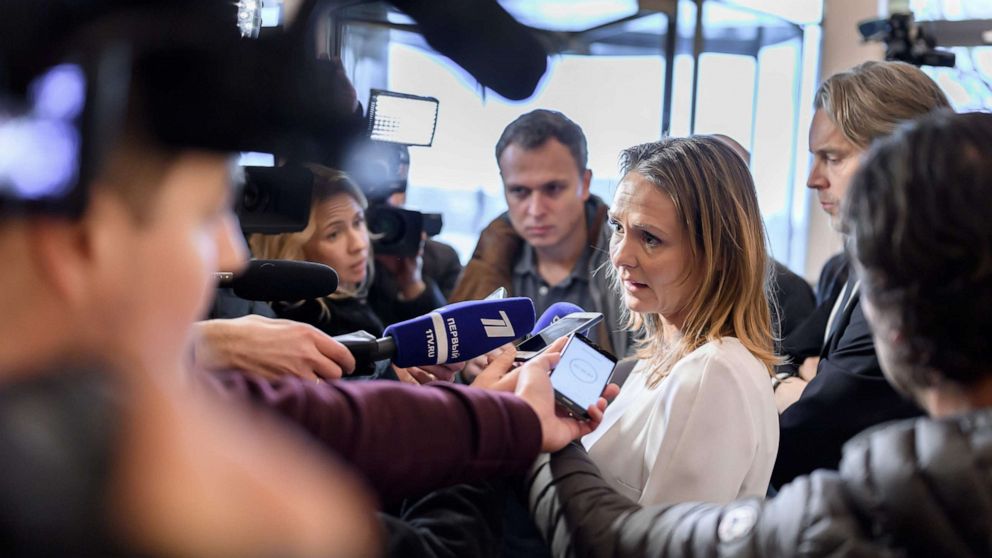Russia banned from Olympics again over doping cover-up
MOSCOW -- The World Anti-Doping Agency (WADA) has banned Russia from participating in all major international sporting events, including the 2020 Olympics and the 2022 soccer World Cup, over its failure to end the cover-up of doping by its athletes.
WADA’s executive committee voted unanimously at a session in the Swiss city Lausanne on Monday to accept a recommendation to ban Russia from fielding athletes under its flag and team names at any major international competitions for the next four years, meaning Russia will miss a second Olympics in a row over doping.
The vote endorsed a recommendation that WADA's compliance board made in late November after finding that Russia was still not cooperating with it and had continued to try to conceal possible doping violations.
As a result, Russia will be officially absent at the Summer Olympics in Tokyo next year and at the soccer World Cup when it is held in Qatar in 2022, as well as potentially a host of other top events.
WADA has said, however, that Russian athletes able to prove they are clean and unconnected to the doping cover-up will still be allowed to compete as “neutrals.”
That is the same decision as during the most recent Winter Olympics in South Korea last year, where Russian teams took part wearing a special “neutral” uniform and the Russian flag and anthem were banned from medal ceremonies. Russia’s official medal score at that Olympics was also zero.
Russia will also be banned from hosting any international sporting events for four years and those events that are already due to take place there must be moved. Russian officials will also be forbidden from attending the events while the ban is in place.
The ban, though severe, still stops short of a blanket ban demanded by some other countries. 168 Russian athletes took part in the 2018 games in Pyeongchang as neutrals, with some still winning medals, and WADA will likely still face criticism for still allowing some Russia athletes to compete. The body had to strike a difficult balance between punishing Russia, while protecting clean Russian athletes who have spent their lives training to compete. The chairman of WADA's compliance committee, Jonathan Taylor said that WADA had identified at least 145 Russian athletes whose results had been tampered with and who would therefore be banned from the Olympics.

The decision is a still a stunning blow to Russian sports, which have been upended by the doping scandal since it began in 2015. Russia has also already missed two Paralympics, and virtually its entire track and field team was excluded from the Summer Olympics in Brazil in 2016 -- punishments which had been unprecedented for doping.
It is up to the International Olympic Committee how the new ban will be handled, but it has already said it will be bound by WADA’s recommendations. Russian officials on Monday questioned whether the ban would also apply to the World Cup, but WADA's Taylor said it would, saying if Russia's team qualified, they would have to play as neutrals. The ultimate decision depends on world soccer's governing body FIFA.
WADA made the recommendation to ban Russia after its investigators said it had found evidence Russian anti-doping authorities were still concealing possible doping by its athletes.
The anti-doping body's president, Sir Craig Reedie, in a statement, said the decision showed "determination to act resolutely in the face of the Russian doping crisis."
"For too long, Russian doping has detracted from clean sport. The blatant breach by the Russian authorities of RUSADA's reinstatement conditions demanded a robust response," he said, referring to the reinstatement of Russia's national anti-doping agency.
"Russia was afforded every opportunity to get its house in order and re-join the global anti-doping community for the good of its athletes and of the integrity of sport, but it chose instead to continue in its stance of deception and denial," Reedie said.
Russia now has 21 days to appeal the decision. If it chooses so, it will be considered by the Court of Arbitration for Sport, sports top appeals court.
The doping scandal first broke out in 2015, when athletes came forward with evidence of sprawling state-sponsored cover-up of doping that was later shown to take in dozens of Russian athletes over almost a decade, including at the 2014 Winter Olympics that Russia hosted in 2014.
Russia has always refused to admit that the cover-up was state-sponsored, instead arguing a handful of officials and coaches conducted it. It also claimed the allegations are politically motivated.
Substantial evidence, however, has emerged over the years showing the state directed the scheme. In 2016, the former head of Russia’s anti-doping laboratory in Moscow, Grigory Rodchenkov turned whistleblower and showed how he and the lab, as well as Russia’s FSB security service had worked to hide hundreds of positive doping tests.

The cover-up, as described by Rodchenkov, was confirmed by a commission appointed by WADA, led by Richard McLaren in 2016. Another IOC-commissioned investigation also confirmed the broad outlines of the cover-up.
Since then, Russia has taken some steps to overhaul its anti-doping system, but in November, WADA said it had found signs, once again, Russia was still hiding violations and trying to discredit the WADA investigations even as late as last winter.
A WADA compliance report in late November 26 said it had found that hundreds of likely positive doping tests had been deleted from a database of results held by Russia’s anti-doping lab given to WADA in 2019.
Russia has since refused to hand over a full copy without the deletions, the WADA report said. In addition, the investigators found that in late 2018 “fabricated evidence” had been planted in the databased provided to WADA an effort to discredit the claims made by Rodchenkov and other whistleblowers. Evidence had also been deleted in an effort to exonerate another doping official, who has been playing a prominent role in Russia’s defense and painting Rodchenkov as a liar, the report said.
In Russia, where the ban hit like a national crisis, officials and Russian state media once again denounced it as politically motivated and biased.
Prime Minister Dmitry Medvedev attacked WADA's decision an example of "anti-Russian hysteria" and said Russia ought to appeal. But he also acknowledged that Russian sport still has "many problems" with doping.
Russia's sports minister, Pavel Kolobkov, was relatively conciliatory, declining during a televised press conference to directly call WADA's decision "political". However, he appeared to reject WADA's accusations over the test result database, disputing that the data sets WADA had received from whistleblowers was genuine and arguing the body had ignored Russia's responses about the Moscow lab's database.
Kolobkov said he believed RUSADA had good grounds for appealing the decision or some aspects of it at CAS, but said that would happen only once RUSADA informed WADA it did not agree with it within the 21-day appeal deadline.
But there were also unusual statements from some saying that the blame lay mostly with Russian sporting officials who had failed to get a grip on the crisis.
The head of Russia's national anti-doping agency, RUSADA, Yuri Ganus, called for a new approach and seemed to appeal to President Vladimir Putin to intervene to change it.
“Our country has a tragedy. We have a national leader, to whom officials look to. And we are waiting for decisive actions from him. " Yuri Ganus said at a press conference in Moscow. He said Russian officials must now handover the database of sample results being demanded by WADA, saying that "obstacles" had been created.
"We need to conduct a detailed investigation to find this database. Nothing is finished yet. We need to hold an investigation, to find the databases and hand them over to WADA,” Ganus said.
Many other Russian sporting officials were unrestrained in their anger, attacking it as unjust, with the president of the Russia's Olympic Committee, Stanislav Pozdnyakov calling the punishments "indecent, illogical and excessive."
"I don't have any words," said Aslanbek Khushtov, a former Olympic greco-roman wrestling champion told TASS. "How can you mock athletes who spent their entire lives working to this? Unfortunately, this is politics, I don't smell any sport here," he said.
But another RUSADA official said it was necessary to recognise that not enough had been done. "I hear the federation presidents and experts, who are proudly declaiming their activity, that they have answered everything, around us are only enemies who want to attack our sportspeople. That all speaks to how our anti-doping culture hasn't changed," Margarita Pakhnotskaya, RUSADA's deputy director told Interfax.




